If you’re wondering why your RV air conditioner compressor isn’t coming on, you’ve come to the right place! This article will provide helpful tips and frequently asked questions about how to troubleshoot and diagnose a non-functioning compressor. We’ll cover topics like what could be causing it, what steps to take if it’s not turning on, and more. By the end of this article, you’ll know exactly what to do if your RV air conditioner compressor isn’t coming on. So let’s get started!
Table of Contents
What is an AC Compressor?
It works by compressing refrigerant gas and then pushing it around to different parts of the system, which can cool down the air inside your RV. [2]
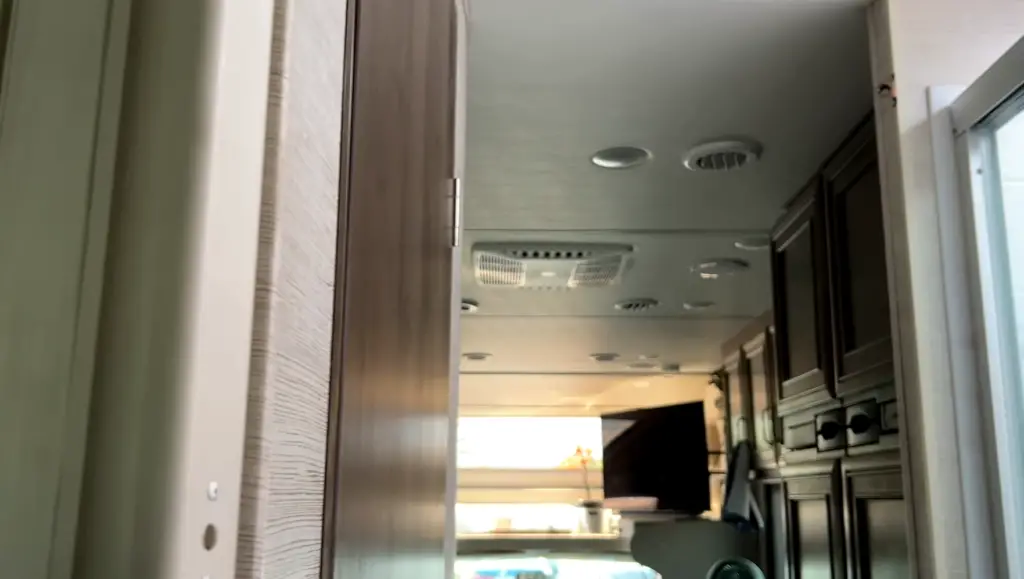
What Are Common Signs Or An RV Air Conditioner Problem?
Fan Runs But Warm Air Comes Out
If the fan in your air conditioner is running but you’re not feeling any cool air coming out, this could be a sign that something is wrong with your unit. The most common cause for warm air to be released is an issue with the compressor. While the fan may run, it won’t blow cold air if the compressor isn’t running. [1]
The RV Air Conditioner Does Nothing
If your air conditioner doesn’t turn on at all, there could be a number of issues causing this. It could simply be a blown fuse or tripped circuit breaker that needs to be reset. If the RV is plugged into shore power and these are not the issue, it could be due to worn electrical connections, faulty wiring, or a bad thermostat. [1]
The Air Coming Out Is Stale and Air Flow Is Weak
If your RV air conditioner is running but the air coming out isn’t cold and the flow is weak, your cooling system may need to be cleaned. A clogged filter or dirty condenser can cause a decrease in air flow and cooling capacity, resulting in warm air being released from the unit. [1]
How Does An RV AC Compressor Work?
An RV air conditioner compressor works the same way as a traditional home air conditioning system. The warm air from outside is drawn into the AC unit, where it passes through cooling coils. This cools the air and releases condensation in the form of water droplets. These droplets are then carried away by a drain tube to an area outside the RV, or to a collection tank.
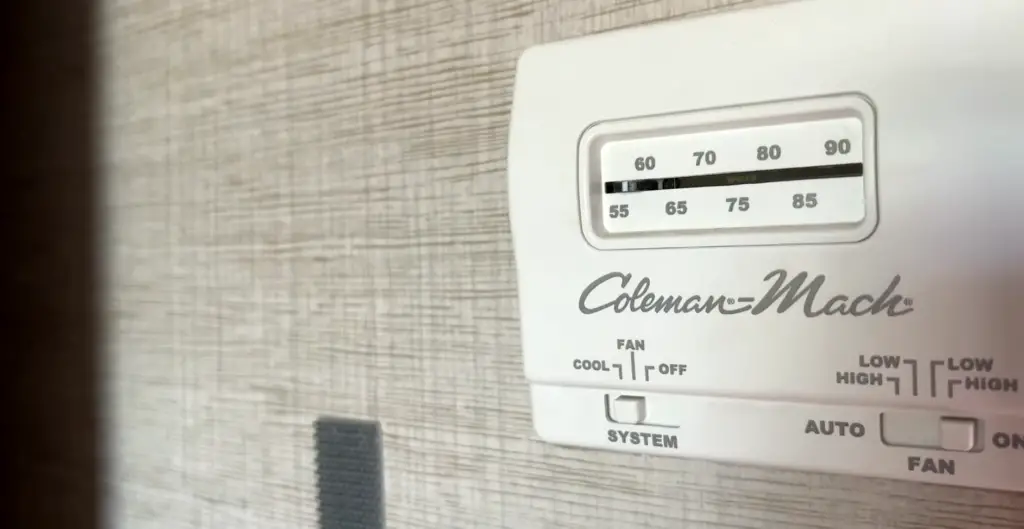
Once cooled, the air is pushed through ducts in the RV and out vents inside, providing you with cool air inside your vehicle. The compressor itself is responsible for cooling and circulating the refrigerant fluid that runs throughout the AC unit and helps keep things cold. [1]
My RV’s Air Conditioner Compressor Won’t Start
If your RV’s air conditioner compressor isn’t coming on, it can be an extremely frustrating experience. After all, you rely on the AC to keep your cool during those hot days or long drives. Don’t worry – we’ve got some tips that may help you get it fixed in no time! [1]
Symptoms Of A Bad AC Compressor Capacitor Problem
If you’re having trouble with your RV air conditioner compressor not coming on, one of the likely culprits may be a bad AC compressor capacitor. This essential component helps to start up and run the motor in an air conditioning unit. It stores electrical energy temporarily and releases it when needed to keep the motor running. A defective or damaged capacitor can prevent the motor from starting.
When dealing with a bad AC compressor capacitor, here are some symptoms you may experience:
- Poor cooling performance or no cooling at all – The air conditioner isn’t producing sufficient cool air or any cool air at all.
- Loud, intrusive noises – If your RV’s AC is making loud, buzzing noises, it could be indicative of a bad AC compressor capacitor.
- Not starting up – The AC may not start up when switched on due to the motor not receiving enough electrical power from the capacitor. [1]
What Does An Air Conditioner Capacitor Do?
Having an issue with your air conditioner not turning on could mean that the capacitor needs to be replaced or checked. A professional technician should be consulted to help diagnose and fix the problem. [1]
What Does A Bad Air Conditioner Capacitor Look Like?
A bad air conditioner capacitor can vary in appearance, depending on the type of unit. Generally, it will be a disc with two connectors (one positive and one negative). If there is any bulging or swelling around the case of the capacitor, then it has likely gone bad. Another way to tell if a capacitor has gone bad is if it is leaking any kind of fluid.
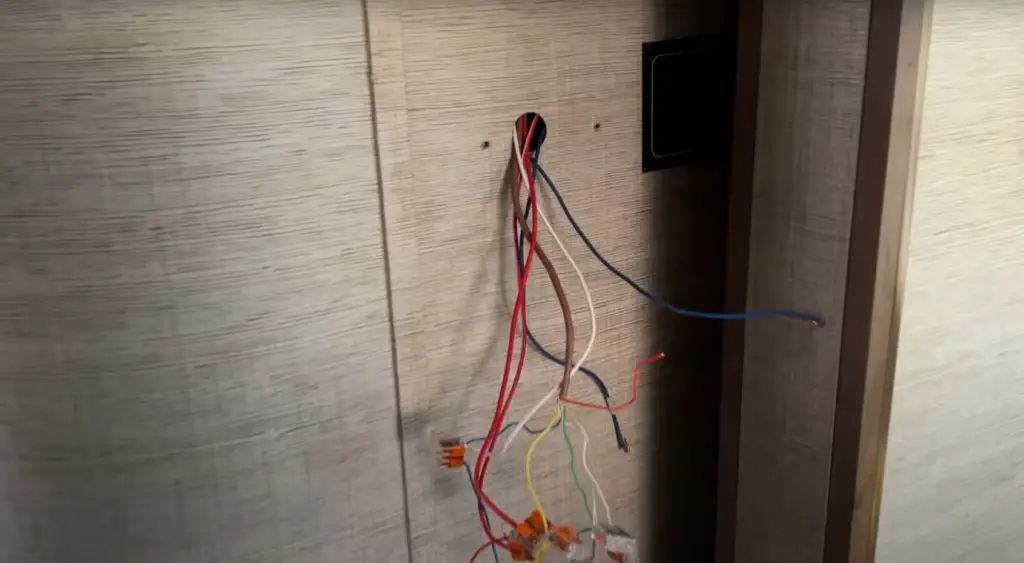
It is important to note that the capacitor should never be opened up as this could potentially cause serious electrical shock. If you suspect that your air conditioner’s capacitor has gone bad, it is best to contact a professional HVAC technician for diagnosis and repair. [1]
Checking Other Components Of Your RV’s Air Conditioning Compressor
Check The Air Conditioner’s Start Relays
One of the most common problems with RV air conditioners is that their start relays can become worn out or damaged. The start relay serves as a connection between the thermostat and the compressor, so if it’s not working properly then the compressor won’t be able to turn on. To test whether this is the problem, open up the access panel on your RV’s air conditioner and locate the start relay. If it appears to be damaged or worn out, then you’ll need to replace it in order for your compressor to work properly again. [1]
Check for Power
If the start relay appears to be in working order, then it’s time to check for power.
You should also check all of the fuses on your RV’s air conditioner to ensure that they are all in working order. If you’re not able to diagnose the problem, then it might be best to contact a professional for help. [3]
Check The Circuit Breaker Or Fuse Panel
Another possible culprit for why your RV air conditioner’s compressor isn’t turning on is the circuit breaker or fuse panel. Over time, these components can become worn out and stop working properly. To check if this is the case, open up the access panel on your RV and locate the circuit breakers or fuses. If you can’t find the problem, then it’s best to contact a professional for further assistance. [1]
Compromised Valves
In some cases, the compressor won’t turn on because of a problem with the valves. RV air conditioners have two valves that need to be in working order for the compressor to function properly. If one of these valves isn’t functioning properly, then it could prevent the compressor from turning on. To check if this is the problem, open up the access panel on your RV’s air conditioner and locate the valves. If one of them appears to be damaged or not in working order, then you’ll need to replace it in order for your compressor to turn on again. [1]
Check The Air Conditioner Filter
It’s important to check the air conditioner filter on your RV. If it’s clogged or dirty, then this could be preventing the compressor from turning on. To clean the filter, open up the access panel and locate the filter. Then, remove the filter and use a vacuum cleaner or brush to remove any debris or dirt. Once it’s been cleaned, replace the filter and make sure all of the connections are secure before testing if your RV air conditioner is working again. [1]
Capacitors
If all of the above components appear to be in working order, then the problem is likely a faulty capacitor. The capacitor helps to start and stop your compressor, so if it’s not functioning properly then the compressor won’t turn on. To check if this is the issue, you’ll need to open up the access panel and locate the capacitor. Once you’ve found it, check for any visible signs of damage or wear and tear. If the capacitor appears to be faulty, then you’ll need to replace it in order for your compressor to work properly again. [2]
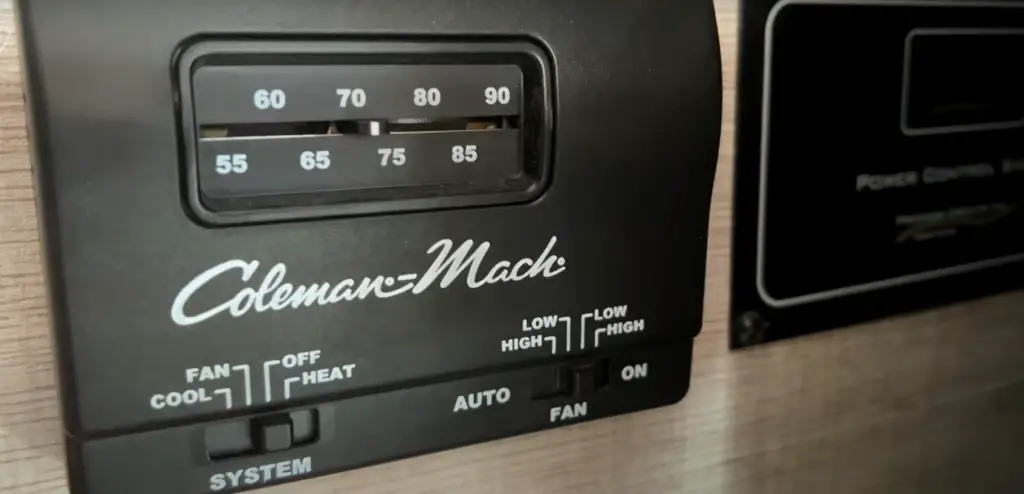
Terminal Connections
The last thing to check is the terminal connections on your RV’s air conditioning system. If any of these connections are loose or broken, then this could be preventing the compressor from turning on. To check if this is the problem, open up the access panel and locate all of the terminal connections. Then, make sure that they are all tight and secure. If any of them appear to be broken, then you’ll need to replace them in order for your compressor to turn on again. [2]
Dead Compressors
If you suspect your RV air conditioner compressor is dead, the first step is to check the power. Check your AC’s fuse box and ensure that all fuses are in good working order. If a fuse has blown, it will need to be replaced before continuing with other checks.
The next step is to inspect the outside of the AC unit for any signs of damage. If you discover a tear in the compressor’s electrical wiring, it needs to be repaired before further troubleshooting can occur. [2]
How To Tell If Your Compressor Is Bad?
If your compressor has suddenly stopped working and the air conditioner is not coming on, there are a few ways to tell if it’s a bad compressor.
The first way requires you to remove the RV air conditioner’s cover or shroud so that you can get an overview of what’s going on inside the unit. If you see any kind of visible damage, such as a burnt smell or smoke, then it is likely that the compressor has gone bad and needs to be replaced.
The second way to tell if your compressor is bad is by listening for any odd noises coming from the air conditioner. A faulty compressor can make loud rattling or grinding noises, which is a sign that the compressor needs to be replaced.
The third way to tell if your compressor is bad is by checking the voltage output of the unit. To do this, you can use an AC voltmeter to measure the voltage coming from the RV air conditioner’s compressor. If it falls below 120 volts, then it’s likely that the compressor has gone bad and needs to be replaced. [1]
RV Air Conditioners Maintenance Tips
One of the best ways to prevent your RV air conditioner compressor from not turning on is to maintain it regularly. Every four months or so, you should check for any dirt buildup in the filters and vents and clean them out as needed. Additionally, make sure the condenser coils are free from debris and dust particles. Additionally, you may want to inspect the wiring and air ducts in your RV. If you find any frayed or damaged wires, it’s best to have them replaced as soon as possible. [3]
If you suspect there’s something wrong with the compressor itself, you may want to call an RV expert or technician for a thorough inspection of your unit.
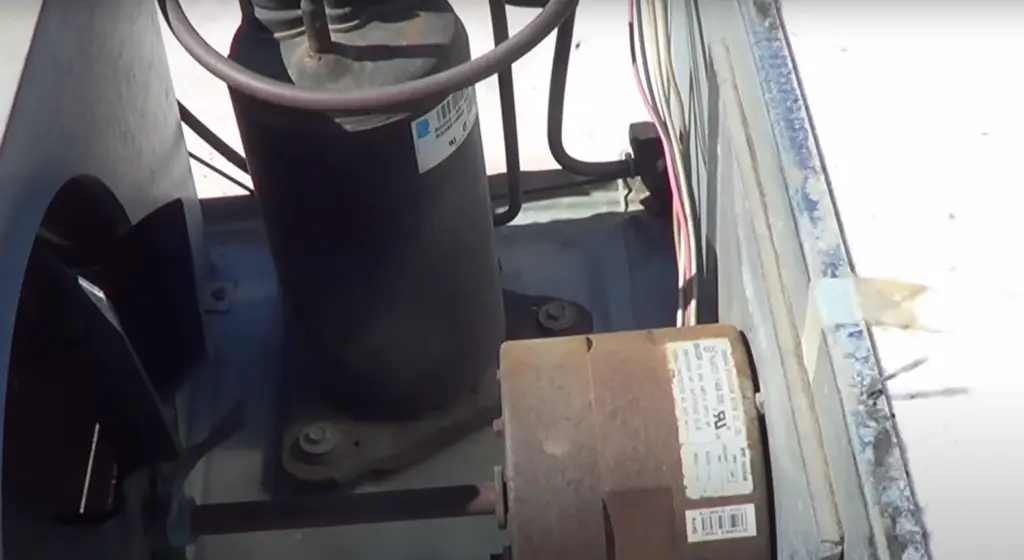
Common Problems with RV Air Conditioners
RV Air Conditioner Won’t Turn On
If you find that the compressor of your RV air conditioner won’t turn on, there are several possible causes. Before attempting any repairs yourself, it’s best to contact a professional for help.
The most common cause of an RV air conditioner not turning on is a lack of power. Ensure that the circuit breaker is not tripped and the power is on. If the power is on, make sure that the RV air conditioner’s thermostat is set to “cooling” mode and it’s temperature setting is lower than the room temperature. The RV air conditioner may also be malfunctioning or have a faulty part. [3]
RV Air Conditioner Turns on and Off Repeatedly
If the RV air conditioner compressor turns on and off repeatedly, there may be a few potential causes. It’s possible that the unit is too large for the space it’s cooling, so it has to cycle on and off frequently in order to maintain the desired temperature. The filter might also be clogged with dirt and debris, blocking air flow. Check the filter and clean or replace it if necessary.
On the other hand, it’s also possible that there is a wiring problem or faulty component inside of the RV air conditioner. If you suspect this to be the case, contact an experienced technician for help with repairs. [3]
RV Air Conditioner Leaks
If you find that your RV air conditioner is leaking water, it’s important to address the issue as soon as possible. The most common cause of a leaky RV air conditioner is blocked or worn out drainage pipes. Make sure to check the condensate drain line for any clogs and clean it if necessary. [3]
RV Air Conditioners not blowing cold air
If the RV air conditioner is not blowing cold air, it’s likely that the compressor is malfunctioning. First, check to make sure that the thermostat is set to “cooling” mode and the temperature setting is lower than the room temperature. The RV air conditioner may also be low on refrigerant, so call a technician to check and refill the system if necessary.
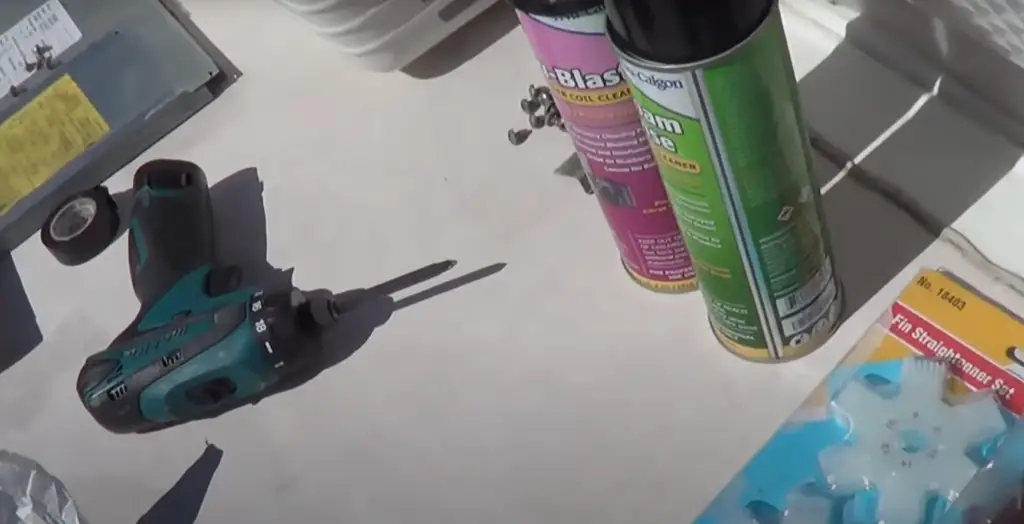
It’s also possible that the compressor is overheating due to dirt or debris buildup, causing it to shut off before properly cooling the room. If this is the case, you’ll need to contact a technician for professional cleaning and maintenance.
If you’re still facing issues with your RV air conditioner, it’s important to get help from an experienced technician. They will be able to diagnose the problem and provide the best solution for repair or replacement. [3]
RV Air Conditioners that are Noisy
If you find that the RV air conditioner is making more noise than usual, it’s possible that one of the fan blades has become loose or warped. Check to make sure all the bolts and screws are tight and replace any worn-out parts if necessary. [3]
FAQ
Why is my RV AC compressor not working?
Your RV air conditioner compressor not coming on could be caused by a number of different things, including a faulty thermostat, inadequate power supply or even leaking refrigerant. It’s important to troubleshoot the issue carefully to determine the cause and take corrective action.
How do I get my AC compressor to kick on?
Start by checking the thermostat. Make sure that it’s properly set, and if necessary adjust the temperature or fan speed settings to ensure that the compressor will kick on when needed. You should also check to make sure that your RV is receiving sufficient power from your RV battery or a generator – sometimes this can be the cause of an AC compressor not coming on.
Finally, inspect the refrigerant lines for any signs of leaks or blockages. Leaks can prevent the compressor from getting enough refrigerant to properly operate, while blockages can stop the flow of cool air altogether. If you find a leak, seal it up right away and contact an RV repair service if necessary.
Is there a reset button on AC compressor?
Most RV air conditioner compressors do not have a reset button. Instead, if your compressor is not turning on, you should inspect the thermostat and power supply first as described above. If all else fails, try unplugging your unit from its power source for at least 15 minutes before plugging it back in again to see if it will restart.
How do I reset my compressor?
If you’re still having trouble with your RV air conditioner compressor not coming on, it’s best to consult a professional. They can help diagnose and repair the problem, as well as provide any additional advice or tips for keeping your unit running smoothly. If the issue is due to a faulty thermostat or power supply, resetting the compressor likely won’t be necessary. However, if all else fails, unplugging your unit from its power source for at least 15 minutes before plugging it back in again may be enough to reset the compressor and get it running again.
How long does it take an AC compressor to reset?
Keep in mind that if the issue is caused by a deeper problem, such as a faulty thermostat or inadequate power supply, it may take longer than 15 minutes to properly reset your compressor.
How do I know if my AC compressor is locked up?
If your RV air conditioner compressor is locked up, it may be difficult to tell without taking a closer look. If the compressor isn’t coming on or is making funny noises when you turn the unit on, that could be a sign of a locked-up compressor. Another symptom of a locked-up compressor is if the fan stops blowing air while the compressor is running. If you suspect your AC compressor may be locked up, it’s best to contact a professional for help with diagnosis and repairs.
How do I reset my RV AC unit?
If your RV AC unit isn’t working properly, the first step is to inspect the thermostat and power supply as described above. If all else fails, try unplugging your unit from its power source for at least 15 minutes before plugging it back in again to see if it will restart. This should reset any faults and get your AC unit up and running again. However, if the issue persists it’s best to contact a professional for help with diagnosis and repairs.
How do I know if my AC compressor is blown?
If your RV air conditioner compressor is blown, it will likely be accompanied by some noticeable signs or symptoms. You may notice loud sounds from the unit, like grinding or rattling noises when it’s running. You may also experience a sudden drop in cooling performance, indicating that the compressor isn’t able to generate enough cold air to keep up with demand. If you suspect your AC compressor is blown, it’s best to contact a professional for help with diagnosis and repairs.
Useful Video: RV Air Conditioner Maintenance
Conclusion
We hope this article has helped you understand why an RV air conditioner compressor may not be turning on and what to do in order to fix the issue. If none of these troubleshooting steps work, then it’s best to contact a professional for further assistance.
Remember, taking preventative maintenance steps such as cleaning the grill and keeping the air filter clean can help to avoid this issue entirely. Taking proper care of your RV’s AC system will ensure that it continues to provide you with optimal cooling power for many years to come!
Thanks for reading and happy travels!
References
- https://www.rvingknowhow.com/rv-air-conditioner-compressor-not-coming-on/
- https://www.senicaair.com/article/what-to-do-when-your-ac-compressor-wont-turn-on
- https://www.pickhvac.com/rv-air-conditioner/repair/

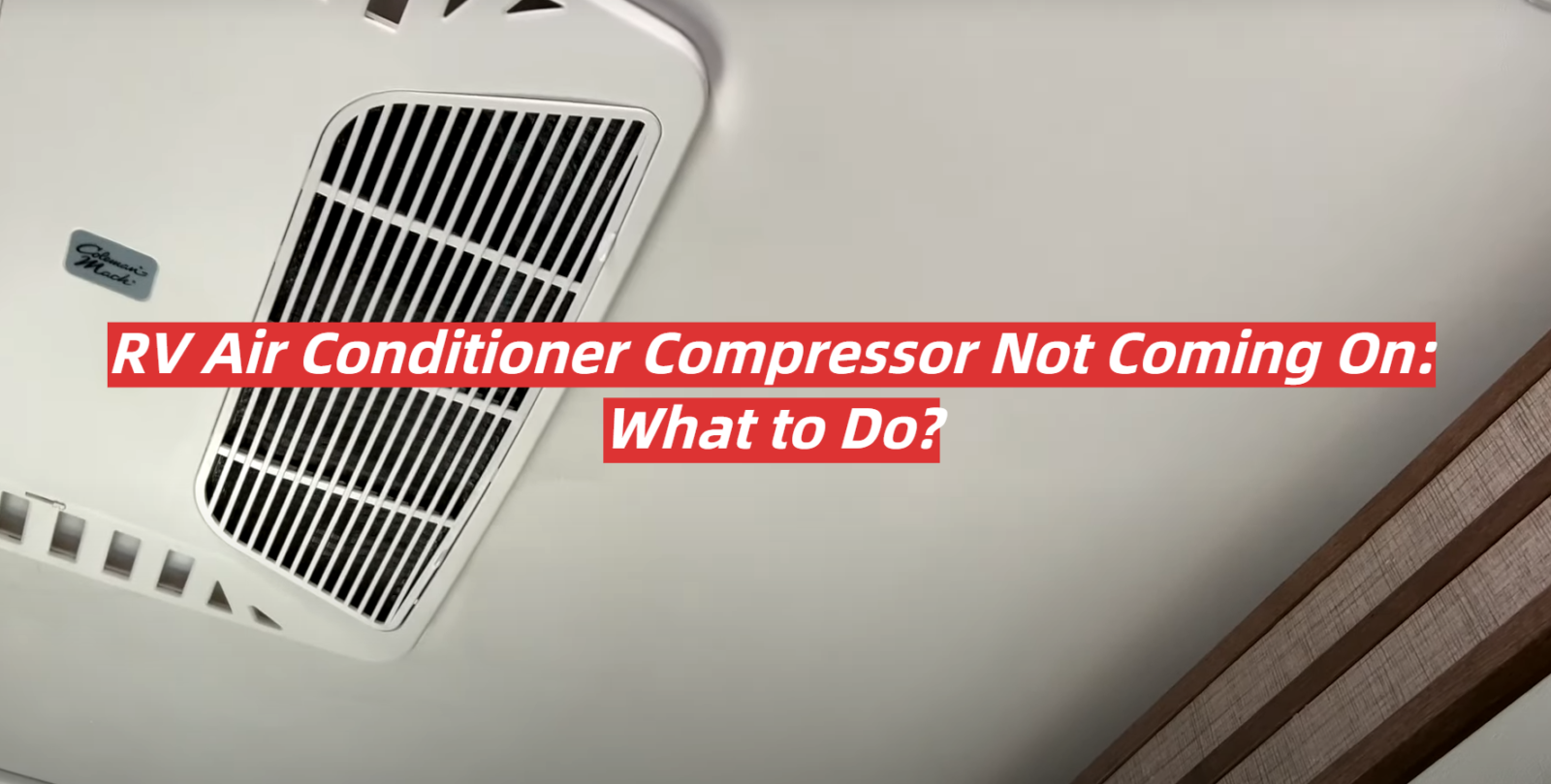
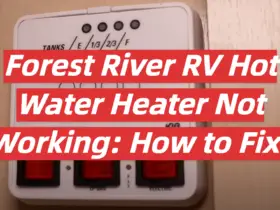
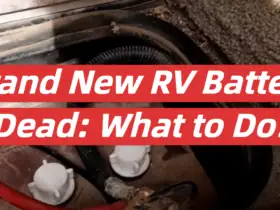
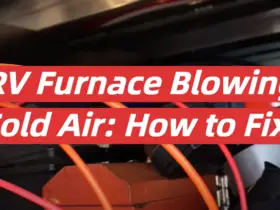

Leave a Reply